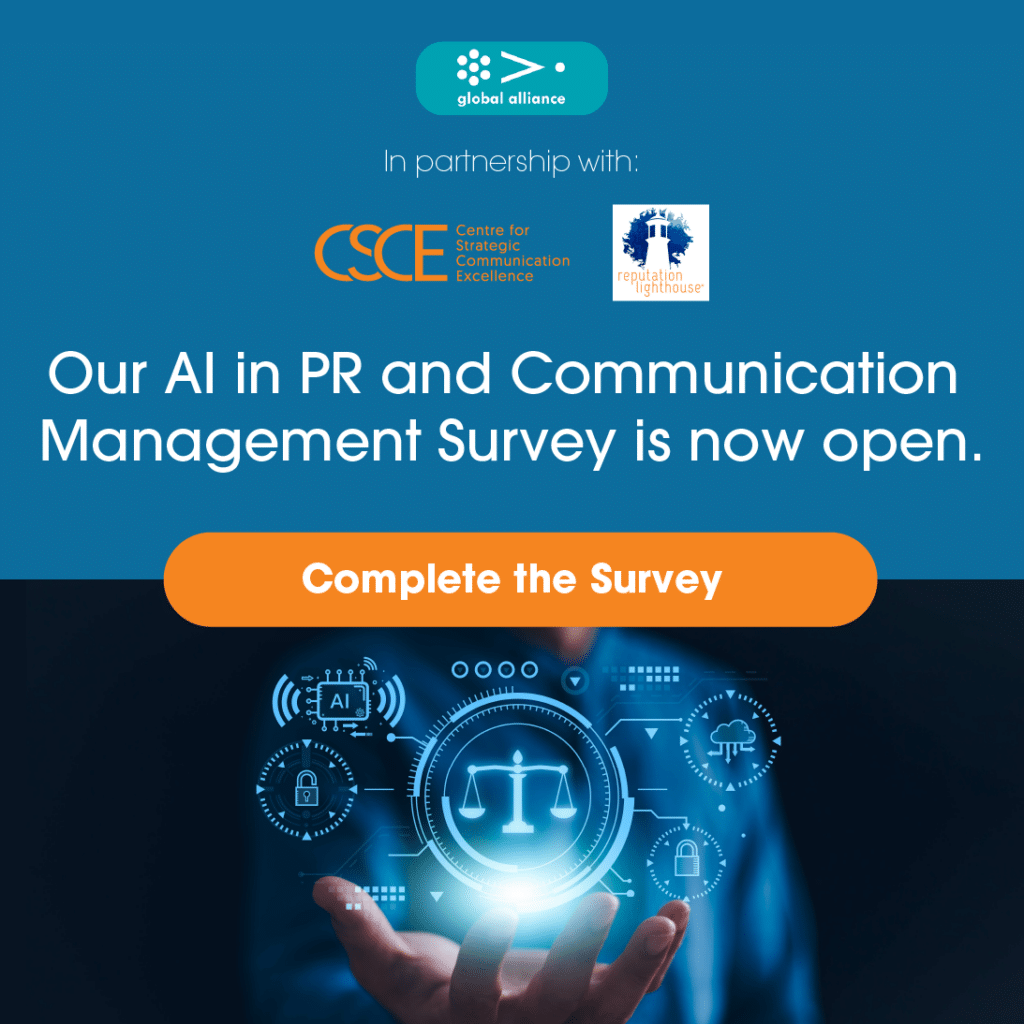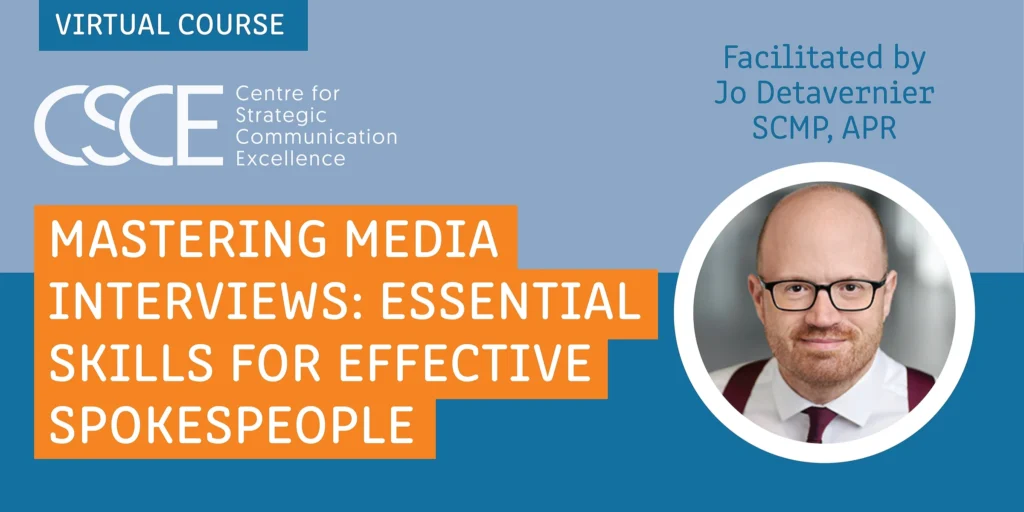Responsible AI for the Communication Profession
The Organisation for Economic Co-operation and Development (OECD) Principles on Artificial Intelligence (AI) adopted in May 2019, “promote innovative and trustworthy AI, which respects human rights and democratic values.” (1) Advancements in AI technologies are creating transformative changes within our organisations and the audiences we serve as communication professionals. The landscape of AI for use within our profession in 2024 and beyond can be characterised by:
- Increased adoption
- Technological advancements
- Growing emphasis on ethical considerations
AI plays a central role in both communication strategies and content creation. This means communication professionals need to stay abreast of the latest developments. We must responsibly harness AI’s power to achieve our goals effectively. At the same time, we must support and help our organisations and clients navigate the many challenges and risks of using AI when communicating.
Responsible AI in the communication profession refers to employing artificial intelligence technologies that:
- Adhere to legal and ethical standards.
- Respect privacy and human rights.
- Ensure transparency and fairness.
- Enhance communication outcomes while mitigating potential risks and biases.
AI Plays a Pivotal Role in the Communication Profession
The Global Standard of the Communication Profession defines it this way:
“Communication professionals represent the voice of an organisation as it interacts with customers, clients, employees, partners, shareholders, competitors, and the community. The communication professional brings the organisation to life with a brand voice that aligns its verbal, visual and digital messages and activities with its mission and vision. By clarifying the brand, communication professionals also help ensure the organisation runs efficiently and effectively.” (2)
In the Global Principles and Code of Ethics for Professional Public Relations and Communications Practitioners (GA code 2018), as defined by the Global Alliance for Public Relations and Communication Management:
“We undertake to conduct ourselves professionally, with integrity, objectivity, truth, evidence-based communication, accuracy, fairness and responsibility to our clients, our organisations, their stakeholders and to a wider society.” (3)
At the Centre for Strategic Communication Excellence (CSCE), we believe communication has the power to be a force for good in society.
Communication professionals take a strategic approach to their work, formulating plans informed by research. They engage diverse audiences using various communication styles through multiple communication channels and methods. Communication outcomes are measured and shared openly with audiences to provide accurate insight.
These standards and principles guide us in our work as communication professionals. We must use these standards to formulate our approach to AI and the work of the organisations we serve.
AI has many applications to support the role of communication, including:
-
Personalisation
Using AI algorithms to gain deeper audience insights. -
Content Creation and Curation
Sorting and organising information and creating content. for multiple communication channels quickly. -
Video and Image Analysis and Editing
Detecting objects, emotions and editing content. -
Research, Measurement and Reporting
Finding, sorting and analysing information at speed. -
Speech Recognition and Transcription
From audio to video or even meeting content. -
Content Moderation
Track, review and remove content. -
Social Listening and Media Monitoring
Monitoring news sources and sentiment.
There are many other uses of AI for strategic communication where technology enhances communication professionals’ efficiency, effectiveness, and capabilities. We must however use AI responsibly.
Communication professionals must play an active role in organisations in guiding the use of AI in communication in three ways:
Develop
Responsible Use Guidelines
Implement clear guidelines around the use of AI within communication. These guidelines should address issues such as human-centricity, transparency, fairness, accountability and privacy.
Maintain
Oversight and Governance
Ensure compliance with relevant laws, regulations, and professional standards governing the use of AI in communication, including data protection regulations, anti-discrimination laws etc.
Provide
Training and Development
Provide training and development programs for communication professionals, and other users of AI tools. This includes raising awareness about ethical and moral considerations promoting best practices, and enhancing skills.
The 10 Principles of Responsible AI Within the Communication Profession
The CSCE has developed the following 10 principles of responsible AI to support communication professionals in their work:
1. Human-centric Approach
AI tools enhance human communication; they do not replace it. AI can automate many communication tasks, but human oversight remains crucial. Communication professionals should maintain control over the development and deployment of AI tools for communication in their function and organisation. It is essential to harness the transformative potential of AI while mitigating credibility and reputational risks and maximising organisational and societal benefits.
2. Transparency, Responsibility and Governance
Communication professionals commit to transparency and responsible disclosure regarding AI used in communication. We provide meaningful information appropriate to the organisation’s context, informing our audience of their interactions with AI tools and building awareness and understanding of the tool. We must correct any errors, biases, or unintended consequences that may arise, as well as publicly correct misinformation caused by using AI. Ultimately, communication professionals are responsible and accountable for communication from their organisation.
3. Privacy and Data Protection
AI tools must respect individual privacy and adhere to data protection laws and regulations within the organisation’s context. Communication professionals handle personal data securely and obtain consent for data collection and usage when necessary. Communication professionals ensure their organisations abide by privacy and data protection laws, regulations, and policies.
4. Legal and compliance
Communication professionals must ensure they have the intellectual property rights to use AI technologies. This may involve obtaining licenses for proprietary AI algorithms or ensuring compliance with open-source licenses for publicly available AI applications. Specific regulations may govern AI use and practices depending on the industry or geography. Our role is to ensure we are aware of the legal and compliance issues that affect our work in communication and advise our organisations or clients accordingly.
5. Bias and discrimination
The designers and trainers of AI tools should ensure they avoid bias and discrimination in communication. Communication professionals play a role in advising on potential biases in the tools and preventing discrimination. Efforts should be made to ensure the AI system treats all individuals and groups fairly within the organisation’s context.
6. Ethical decision-making
Communication professionals must align their work with the ethical standards and values of the community and organisation to which it is applied. Communication professionals should not engage in deceptive or harmful practices. Ethical and moral considerations should guide personal and organisational actions. We uphold our commitment to ethical standards for communication professionals by adhering to the codes of conduct established by the professional organisations to which we are affiliated.
7. Security and risk
Communication professionals must work with their organisations to ensure security measures and policies are in place for the various AI tools used for communication. Risks associated with data being leaked and shared through AI are high. Governance and education are critical in this area, and communication professionals should ensure they play a part in their organisation’s risk management process.
8. Accessibility
Communication professionals ensure all audiences have access to information. AI tools used in communication are inclusive and can be used by everyone.
9. Training, development and advocacy
Communication professionals provide continuous employee training and development to ensure the safe, responsible use of AI-powered communication tools. Training and development should evolve as the AI landscape evolves. We provide the resources, tools, and templates to enhance the communication skills within our organisation, ensuring alignment with organisational objectives. Communication professionals play an active role in protecting the integrity of, and building trust in, the communication profession. We have a global voice on ethical and moral standards, and the principles that govern our profession.
10. Continuous improvement
Communication professionals monitor and evaluate communication tools and their performance. Regular updates and refinements should be made to enhance the capabilities of these tools and remove biases and errors. Guidelines around responsible AI should be regularly reviewed and updated as technology changes.
Applying these principles will enhance a communication professional’s role in using AI and provide a framework for the governance of AI used for communication. It provides a context to support our work with leaders, organisations and clients in thinking through the implications of AI tools.
- Centre for Strategic Communication Faculty and AI Forum 2023-24: Adrian Cropley OAM, FRSA, IABC Fellow, GCSCE, SCMP; Dr Amanda Hamilton-Attwell CPRP, IABC Fellow, GCSCE; Bonnie Caver; Dean Askin; Ingrid Nienaber-Dickens; Mary Hills FCSCE, IABC Fellow, ABC, Six Sigma; Paulo Soares GCSCE; Sia Papageorgiou FCSCE, FRSA, GCSCE, SCMP; Sue Heuman FCSCE, IABC Fellow, MC, GCSCE, SCMP (February 2024)
- Centre for Strategic Communication Excellence Values: https://thecsce.com/about/ (2021)
- ChatGPT 3.5 (6 February 2024)
- Forbes – Why 2024 may be the year to see ROI on Generative AI https://www.forbes.com/sites/cio/2024/02/08/why-2024-may-be-the-year-to-see-roi-on-generative-ai/?sh=1bc5613a4318 (8 February 2024)
- Global Alliance for Public Relations and Communication Management Ethics Policy https://www.globalalliancepr.org/code-of-ethics (2018)
- IABC Global Standard https://www.iabc.com/About/Global-Standard (2011)
- Microsoft – Our commitments to advance safe, secure and trustworthy AI https://blogs.microsoft.com/on-the-issues/2023/07/21/commitment-safe-secure-ai/ (July 2023)
- OECD AI Observatory Policy https://www.oecd.org/digital/artificial-intelligence/ (2019)
- World Economic Forum – 3 lessons from IBM on designing responsible, ethical AI https://www.weforum.org/agenda/2021/09/case-study-on-ibm-ethical-use-of-artificial-intelligence-technology/ (27 September 2021)



